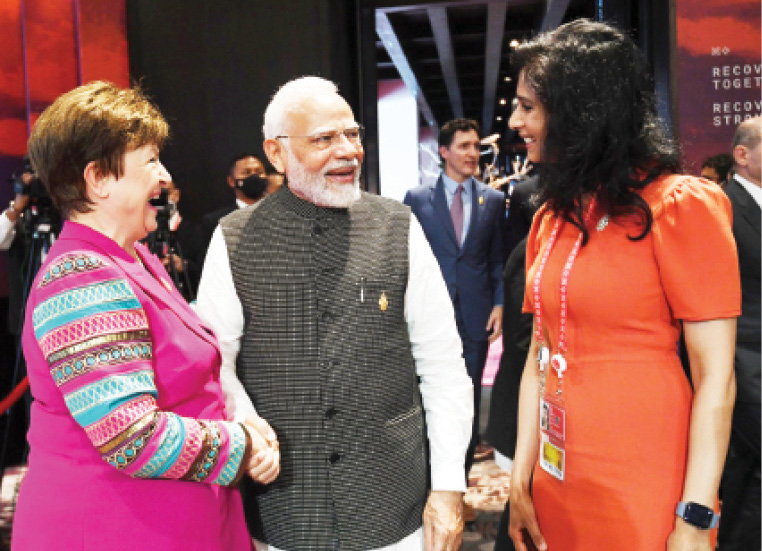A collective effort where the developed world collaborates with emerging markets to create sustainable solutions is the need of the hour.
It is increasingly apparent that the responsibility for global growth will fall on the economic engines of emerging markets.
The year 2023 is interesting and unique from a multilateral perspective. South Africa has the presidency of BRICS this year, while India will lead the G20 deliberations. BRICS countries are also among the G20 members. In many ways the combined leadership of these two groups can set a new benchmark for inclusive global growth.
Such an approach will be of great benefit to the world in a year predicted to be difficult for everyone. The legacy economies of the world will suffer a slowing down for a variety of reasons. The European countries are struggling with an energy crisis triggered by the war in Ukraine. And China is still reeling under the impact of Covid.
“The year 2023 will be tougher since the top three economies of the world, US, EU and China will slow down,” Managing Director of the International Monetary Fund, Kristalina Georgieva said in a sobering assessment. “We expect one third of the world economy to be in recession.”
At Davos this year, India and South Africa will be aligned to the theme of the annual meeting of the World Economic Forum, “Cooperation in a Fragmented World.”
South Africa and India have been championing the principles of cooperation for a while now. During the pandemic, India and South Africa collaborated to offer affordable vaccines to the most deprived.
South Africa and India have also both embraced the technologies of the fourth industrial revolution (4IR). The Presidential Commission on 4IR is coordinating the development of South Africa’s national response to the Fourth Industrial Revolution. The Commission has identified key projects to assist government take advantage of the opportunities presented by the digital industrial revolution.
Samsung South Africa is spearheading large ICT-driven initiatives aimed at empowering previously disadvantaged societies and introducing disruptive innovations that contribute to superior networks that reach remote areas, low-cost smart phones and products that have an increased shelf life. Government will open 4IR micro labs at 10 technology colleges nationwide. In addition, the Council for Scientific & Industrial Research, and the Manufacturing, Engineering & Related Services Sector Education and Training Authority have established 18 Industry Partnered Learning Factories.
The use of mobile based welfare and delivery systems has brought financial and digital inclusion to several hundred million people in India too. The use of drones and blockchain in various sectors is becoming commonplace in the country.
Countries like South Africa and India will be in a position to accelerate their growth while enhancing their investor friendly policies. Many investors are now looking to derisk from China and expand their footprint to other countries. In many ways these two countries can be the key pivots of growth in their regions. At Davos, these countries will have much to offer to the international investing community.
“For the first time since the 1970s, the world is facing a precarious disequilibrium with growth and inflation moving in opposite directions,” says a WEF statement about the 2023 annual meeting. “This is occurring alongside heightened geo-economic fragmentation, financial sector vulnerabilities, including stretched asset prices and high debt levels, and a climate crisis spiralling out of control, which could magnify any growth slowdown, particularly in emerging markets.”
The leaders of the developed world would do well to study the theme of Davos 2023. There is a need for reforms in multilateral institutions like the United Nations. Issues of climate change and inclusive growth have to be addressed in a collaborative fashion. The current climate crisis was created by the developed countries. They over exploited natural resources, excessively depended on fossil fuels and allowed a wasteful consumer culture.
Today the developed economies expect the emerging markets to curb their consumption while being reluctant to change their own policies. A collective effort where the developed world collaborates with emerging markets to create sustainable solutions is the need of the hour. India and South Africa can lead in their regions. Countries in Asia and Africa are already growing at a higher pace than most developed economies. As investment rises in emerging markets, the economic centre of gravity will move closer to the Global South. Trade within Asia and Africa is rising rapidly too, driven by technology and connectivity.
From cyber security to food security. From economic security to border environment security. The world needs the leadership of emerging economies. A collaborative approach to counter future crises will only be possible through leadership efforts across the world. The world can no longer depend on only the top three economies to navigate everyone through current and impending crises. The recent Voice of Global South Summit organised by India demonstrates that emerging economies are collaborating for sustainable development.
At Davos leaders from the Global North and Global South must sit together to talk solutions as equals. While the Global North has to take responsibility of the climate crises, the Global South has to lead the future towards sustainable growth. WEF Founder and Executive Chairman Prof Klaus Schwab has been arguing for stakeholder capitalism. Davos 2023 will be an occasion for the Global South and North to work towards this ideal.
Pranjal Sharma is a geo-economic analyst and author based in New Delhi.

